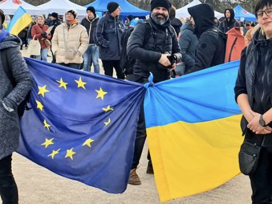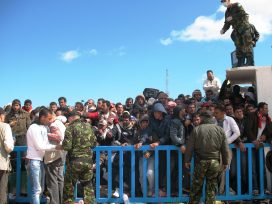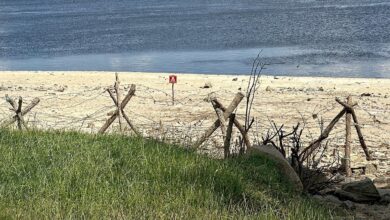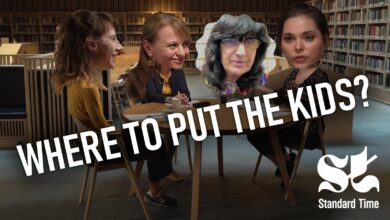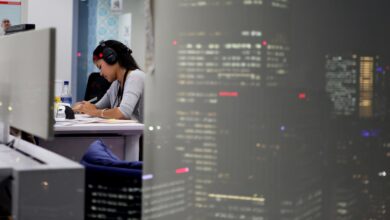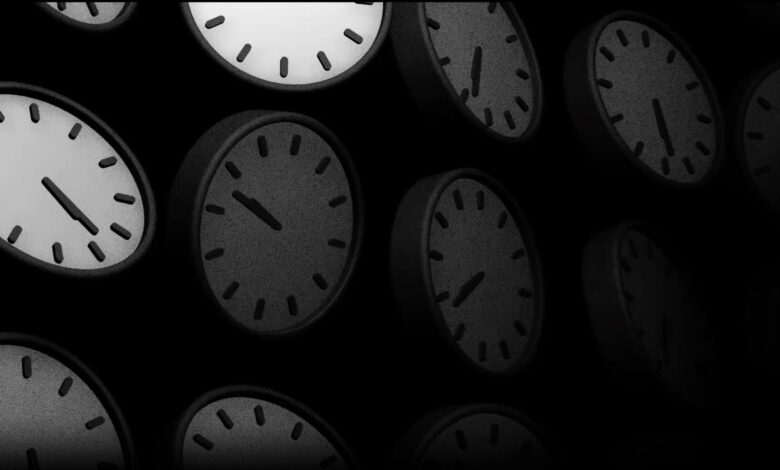
[ad_1]
From the Mediterranean Sea to the deep forests of the Belarusian borders, refugees continue to cross unconventional paths in hopes of finding places to receive them. The so-called ‘warm welcome’ Ukrainian refugees got in 2022 was, indeed a special case, but the bar was really low, Olena Yermakova points out. Martin Wager sees cheap political gains governing European policies, even against obvious needs and interests.
Refugees play a defining role in European life and politics. While the EU brags about its commitment to upholding human rights, it at the same time executes repressive measures against them. This polarity of actions, reflected by the societies’ opinions, can be seen in the split between recent Ukrainian refugees and asylum seekers arriving from other countries. While the former was given temporary protection status following Russia’s aggression, the latter must undergo a more tedious process to secure a longer-term status.
Despite these legal differences, similar challenges persist for both; namely, Europe’s deepening housing and employment crises.
In Germany, for example, which is one of the major host countries in Europe, only about 40% of adults with a refugee status had found employment following a five-year residence period. For Ukrainians with a temporary status, many have not managed to enter the labor market, while others have found their way through the diaspora.
While Ukrainians have not had to cross continental boundaries, refugees from South-West Asia, North Africa, and the Sub-Saharan regions, amongst others, did. Whether in the Lampedusa camp in Italy, the ‘jungle’ in Calais, or the Grand-Synthe camp in Dunkirk; they end up living in brutal conditions, with many finding themselves in a constant state of limbo and displacement. As the EU negotiates with its neighboring countries, it is the refugees who pay the price of waiting.
In this episode, we discuss these conditions of asylum alongside anti-immigration policies, discrimination, and their legal implications with our guest speakers.
Martin Wagner is the Senior Policy Advisor for Asylum at the International Center for Migration Policy Development. He specializes in European and international refugee, human rights, and anti-discrimination law. Wagner has authored several studies on European asylum systems and has experience in providing legal assistance, monitoring law enforcement, as well as capacity-building projects in various countries.
Olena Yermakova is an interdisciplinary researcher focusing on Central and Eastern European migration. She was awarded a junior visiting fellowship in the “Ukraine in European Dialogue” program at the Institute of Human Sciences (IWM) Vienna. Yermakova continues her research into Ukrainian labor migrants in Poland at the Research Centre for the History of Transformations at the University of Vienna.
We meet with them at The Alte Schmiede Kunstverein, Vienna.
Creative team
Réka Kinga Papp, editor-in-chief
Merve Akyel, art director
Szilvia Pintér, producer
Zsófia Gabriella Papp, executive producer
Margarita Lechner, writer-editor
Salma Shaka, writer-editor
Priyanka Hutschenreiter, project assistant
Management
Hermann Riessner managing director
Judit Csikós project manager
Csilla Nagyné Kardos, office administration
OKTO Crew
Senad Hergić producer
Leah Hochedlinger video recording
Marlena Stolze video recording
Clemens Schmiedbauer video recording
Richard Brusek sound recording
Video Crew Budapest
Nóra Ruszkai, sound engineering
Gergely Áron Pápai, photography
László Halász, photography
Postproduction
Nóra Ruszkai, lead video editor
Réka Kinga Pap, conversation editor
Art
Victor Maria Lima, animation
Cornelia Frischauf, theme music
Captions and subtitles
Julia Sobota, Daniela Univazo, Mars Zaslavsky, Marta Ferdebar, Olena Yermakova, Farah Ayyash
Sources
The way home by Olena Yermakova in Eurozine
One way or another by Chiara Pagano in Eurozine
‘What do we know about the employment of refugees in Germany?’ Herbert Brüker, Yuliya Kosyakova. IAB-Forum.
A stage of limbo: A meta-synthesis of refugees’ liminality. Ville R. Hartonen, Pertti Väisänen, Liisa Karlsson and Sinikka Pöllänen. IAAP Journals.
Disclosure
This talk show is a Display Europe production: a ground-breaking media platform anchored in public values.
This programme is co-funded by the Creative Europe Programme of the European Union and the European Cultural Foundation.
Importantly, the views and opinions expressed here are those of the authors and speakers only and do not necessarily reflect those of the European Union or the European Education and Culture Executive Agency (EACEA). Neither the European Union nor the EACEA can be held responsible for them.

Source link

